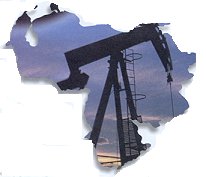South American leaders study energy integration based on natural gas
Venezuela, Bolivia and Peru hold the largest reserves of what it is considered the petroleum of the 21st century

As oil markets go haywire all over the world, South American nations are studying cooperation policies to get tight control of their vast natural gas reserves. Venezuela and the Mercosur bloc (Argentina, Brazil, Paraguay and Uruguay) advanced last weekend in a deal to create a “ring of energy” across the continent to prevent fails in power supplying, but political instability in the region may disrupt plans.
Cheaper to produce and less polluting than petroleum, natural gas is emerging as the fuel of the 21st century, and South Americans are well aware of that. Peru has 11 trillion to 13 trillion cubic feet of proven and probable natural-gas reserves while Bolivia has 48 trillion to 52 trillion cubic feet. Venezuela has the most in Latin America, 149 trillion. Argentina, Ecuador and Brazil have also proven and probable reserves.
With the above in mind, Latin governments are trying to set up controls over the exploitation of this unrecoverable resource by promoting cooperation deals. The main goal is to be energetically independent from the rest of the world and produce natural gas for the benefit of South Americans.
But recent political crisis in Bolivia has lightened a yellow alert in the main capitals of the region as that country has a key role to play in the development of the plan.
From Caracas, Venezuelan President Hugo Chavez, urged the continent's energy producers to create a regional gas company to help fund social development. Chavez, who was attending the Mercosur regional trade summit in Asuncion, Paraguay, said in a televised news conference Monday that the proposed company, Gas del Sur, would serve as an alternative to major energy companies that "would take natural gas to markets where they could sell it for the highest price."
Chavez said Venezuela's gas reserves in the Caribbean could be tapped and shipped to markets in South America. Pipelines could be laid from Venezuela's offshore reserves in the Caribbean to markets in Brazil and Argentina, he said.
At the same time, earlier last week, energy ministers from South America met in Lima, Peru, with country's President Alejandro Toledo in an attempt to obtain a quota from the newly opened Camisea gas basin, in the Amazon jungles. The opening of Camisea had created great controversies, as environmental groups say that it threats with life in the richest biodiversity area of the world. However, Lima considers the project “strategic“ for its fuel needs.
A huge pipeline is expected to unite southern Peru with the north of Chile, Argentina and the south of Brazil to provide these regions with badly need natural gas. The project is being fuelled by Brazil and Venezuelans want it to reach their country and go further west to Colombia and Ecuador, closing the ring, again in Peru.
Peru sees in these projects a good chance to revive its economy and fight against the endemic poverty that slashes one of the richest South American nations.
"With the gas from Camisea and from Block 56, Peru will gain more independence," President Alejandro Toledo said in a September ceremony when the government signed a contract with a Hunt Oil-led consortium to develop the gas. "We will cease to import petroleum," he said, as Peru substitutes natural gas for petroleum.
However, its model of development crushes with the Venezuelan one, which calls for a hegemonic presence of the State. Eventually, Lima and Caracas could lead two separate blocs split on how to make use of the underground resources.
The outcome of the situation in Bolivia, where the interim President announced early elections and a probable total renewal of the parliament is in the horizon, will be determining for the spirit of the oncoming agreements. Argentina, Brazil and Chile looked at Bolivia as their main supplier, and the eventual halt of its production force them to weigh new alternatives.
If a state controlled model prevails, then Venezuelans will celebrate and their position will be significantly increased across the region. This may be the reason why Washington is so interested in strengthening Peru's unpopular government and so concerned in the future of Bolivia.
Subscribe to Pravda.Ru Telegram channel, Facebook, RSS!


